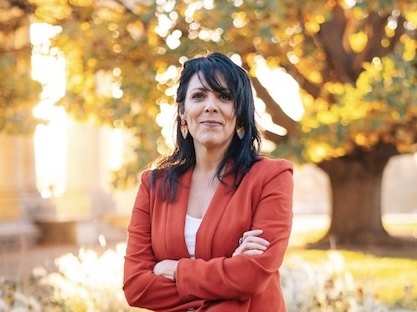Hispanic Heritage series – Part IV of V
Dusti Gurulé was destined to spend her life advancing equity and justice.

Born into a family deeply committed to social justice, Gurule’s activism began at home. Her parents were involved in the founding of significant movements in the 1960s alongside her uncle, Rodolfo ‘Corky’ Gonzales, a key figure in the Chicano civil rights movement.
Her parents, along with other families, were integral to the Crusade for Justice in Denver. She was born just as the Escuela Tlatelolco was founded and spent the majority of her childhood at the school and organization.“Both my parents worked at the building so I went to (the school) up until I was in seventh grade. That really had a huge impact on my life,” said Gurule.
Her transition to public school didn’t diminish her desire for cultural connection. She found her way into MEChA, a Chicano student organization that allowed her to remain active in advocacy and activism.
“I missed and needed that connection to culture and activism and advocacy. And from that point on, that’s been a major part of who I am and the work I’ve done since then,” she said. Today, Gurule serves as the president and CEO of the Colorado Organization for Latina Opportunity and Reproductive Rights (COLOR) and the COLOR Action Fund. The organization is community-rooted and works to enable Latinas and their families to lead safe, healthy and self- determinedlives.
Gurule’s role at COLOR allows her to integrate her life-long commitment to social justice into her work. “COLOR is my political home, and I think it is for a lot of people who gravitate to our organization because of who we are, what we do, how we talk about our work and the changes we make and the support we give to let people be who they want to be,” said Gurulé.
Recently inducted into the Colorado Women’s Hall of Fame, Gurule’s advice for the next generation of Latina leaders is to learn their history. She emphasized it’s important to not just learn about the parts where Latinos and Latinas have been victimized or treated unfairly, but to also learn the resilience of the communities and the stories, lessons, and good cultural traditions. Gurule also said it’s important to build a strong support network.
“Find your values-aligned people, your mentors and friends and circles, because however you define your support, it’s important to curate that,” she said.
When asked about Hispanic Heritage Month, Gurulé said it’s a good reminder of how diverse we are as a nation and that we need to embrace all our differences and the different cultures. She also emphasized the importance of remembering activists who pushed the envelope.
“Without social justice and advocates, we wouldn’t have a lot of the accomplishments that we have in systems and (having Latinos and Latinas in leadership roles),” she said.




